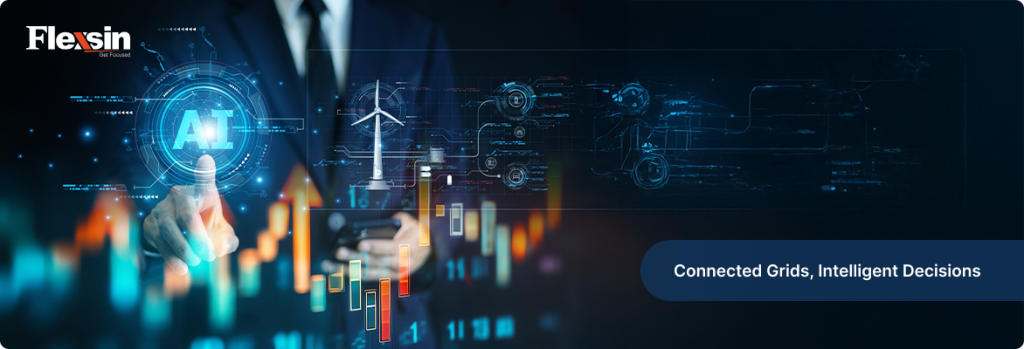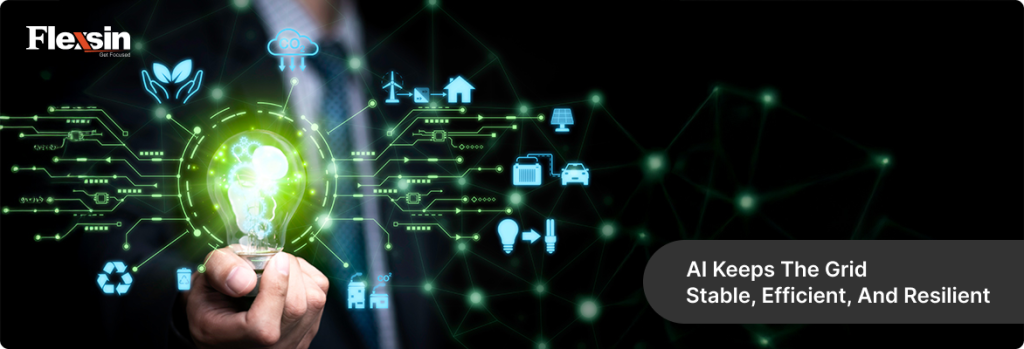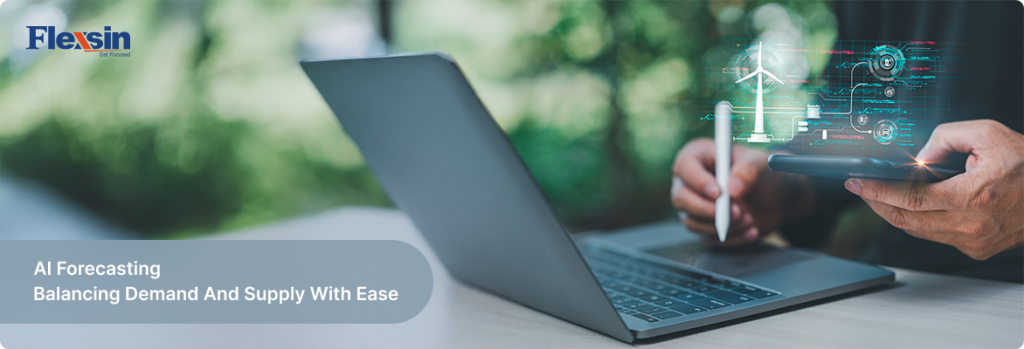Enterprises often face hurdles like customization, integration with legacy systems, and scaling AI solutions for real-world use. The result is often wasted resources, inaccurate energy forecasting, and underperforming grid management software. This is where AI power recommendations consulting services can help energy managers turn complex challenges into measurable business outcomes.
By blending AI in energy with advanced smart grid technology, consulting firms are helping organizations achieve unprecedented control over energy forecasting, demand response, and efficiency projects. Whether it’s optimizing load forecasting for a manufacturing plant or deploying IoT sensors in energy for smarter grid management, the potential is both immediate and transformative.
1. Improve ROI with Custom AI Power Recommendations
For enterprises new to AI-driven strategies, energy management often feels overwhelming. Where should they begin – data collection, infrastructure upgrades, or forecasting models? The answer lies in AI power recommendations consulting services, which guide businesses through the setup, implementation, and scaling phases.
Key beginner-level benefits include:
Simplified integration of AI in power plant operations without disrupting existing workflows.
Access to grid management software tailored for industry-specific use cases.
Quick wins through AI-powered demand response initiatives that lower peak energy costs.
Instead of adopting off-the-shelf solutions, consultants design custom AI power recommendations that align with your enterprise’s unique energy profile.
Smarter Energy Management: Save Money and Drive Conversions
One of the most immediate payoffs of AI in smart grid management is cost optimization. Energy managers typically waste thousands of dollars annually due to poor load balancing and reactive decision-making. With AI load balancing and smart energy storage systems, businesses can:
Reduce operational inefficiencies.
Improve energy purchasing decisions.
Drive higher ROI by allocating resources where they’re most profitable.
For example, a retail chain using AI in energy forecasting saw a 15% reduction in electricity costs within six months by dynamically adjusting HVAC and lighting systems across multiple outlets.
Why Forward-Thinking Enterprises Rely on AI Power Recommendations Consulting
Beyond cost savings, enterprises now recognize AI power recommendations as a long-term growth driver. Why? Because scalable AI in energy efficiency projects supports enterprise-wide sustainability goals while strengthening brand credibility. Key reasons include:
Regulatory compliance through data-driven sustainability reporting.
Improved resilience with AI in power plant operations predicting outages before they occur.
Enhanced decision-making, where predictive analytics replace guesswork in capital planning.
In other words, businesses that adopt AI power recommendations consulting services today are positioning themselves not just for efficiency-but for long-term competitive advantage.

2. Solutions to the Biggest Challenges in AI Power Recommendations
Every business has a different energy footprint. A data center consuming gigawatts of electricity has very different needs compared to a manufacturing unit running multiple shifts. Off-the-shelf AI in energy solutions often fail because they don’t reflect these nuances.
This is where AI power recommendations consulting services excel. Consultants assess your existing infrastructure – be it grid management software, IoT sensors in energy, or legacy monitoring systems-and create custom AI power recommendations. For example:
A healthcare facility may need AI-powered demand response to reduce costs during high patient intake periods.
An industrial plant may prioritize load forecasting to optimize machinery uptime.
A utility provider may require smart grid technology integration to stabilize fluctuating supply.
Tailored consulting ensures that AI aligns perfectly with your operational realities, rather than forcing you to adapt to generic solutions.
Integration: Making AI Work With Legacy Systems and Smart Grids
One of the top concerns for energy managers is: “How will AI integrate with my current systems?” Replacing entire infrastructures is impractical and costly. Instead, AI in smart grid management consulting focuses on seamless integration with legacy assets.
Flexsin’s consulting services emphasize:
API-driven integration between AI tools and existing grid management software.
Deployment of IoT sensors in energy systems that feed real-time data to AI models.
Gradual rollout of AI-enabled modules, minimizing downtime during transitions.
Take, for example, a European utility that integrated AI-powered load balancing into its 20-year-old SCADA (Supervisory Control and Data Acquisition) system. With proper consulting, the utility achieved a 25% improvement in energy distribution efficiency without replacing its infrastructure.
Scalability: Ensuring AI Power Recommendations Grow With Your Business
Another overlooked challenge is scalability. Energy demands evolve as businesses expand, and AI in power plant operations must scale accordingly. What works for a single facility may fail when rolled out across multiple locations.
Scalable consulting solutions involve:
Designing modular AI in energy efficiency projects that can be replicated enterprise-wide.
Implementing smart energy storage systems that scale with increased load requirements.
Building cloud-enabled AI forecasting models that learn continuously as new data flows in.
For instance, a logistics company that started with AI-based energy forecasting for one distribution hub expanded the model across its entire national network. The outcome? Consistent cost savings and improved grid resilience across all facilities.

3. AI-Powered Energy Forecasting for Smarter Decision-Making
For energy managers, forecasting has always been a balancing act between accuracy and uncertainty. Traditional models rely heavily on historical data, often missing sudden shifts in demand. With AI power recommendations, forecasting becomes dynamic and predictive.
Using AI in energy forecasting and load forecasting, managers can:
Predict demand spikes during extreme weather events.
Adjust production schedules in real time.
Optimize purchasing strategies to avoid peak pricing.
Case in point: A large manufacturing enterprise implemented AI in power plant operations for forecasting energy loads. Within one year, the company cut energy procurement costs by 18%, simply by buying smarter and earlier based on AI-driven insights.
Smart Grid Technology and AI-Powered Load Balancing
Smart grids are revolutionizing how power is managed and distributed. But without AI, these grids are reactive, not proactive. By deploying AI in smart grid management, energy managers gain the ability to anticipate demand fluctuations and balance supply instantly.
Key benefits of AI-powered load balancing include:
Preventing blackouts by proactively shifting loads.
Reducing strain on equipment, lowering maintenance costs.
Enhancing resilience during grid disruptions.
For example, a utility company integrated smart grid technology with AI-powered consulting. The system redirected loads across multiple substations in milliseconds, preventing outages during a regional heatwave that caused record-breaking electricity usage.
AI-Powered Demand Response and Smart Energy Storage
One of the most impactful applications of AI power recommendations consulting services lies in demand response and energy storage. Traditionally, businesses respond to grid alerts after the fact, often missing incentives or facing penalties. With AI, the response becomes predictive.
Applications include:
AI-powered demand response that automatically reduces non-essential loads during peak demand.
Smart energy storage systems that release stored power when grid rates are highest.
Integration of IoT sensors in energy to fine-tune consumption at the device level.
Take a retail chain operating 200 stores nationwide. By leveraging AI in energy efficiency projects and coupling them with smart storage systems, the company reduced annual energy expenditures by 12% while qualifying for demand-response incentive programs worth millions.

4. Turning AI Power Recommendations Into Actionable Business Value
For today’s energy managers, the question is no longer “Should we use AI?” but “How can we make AI deliver measurable results?” From AI-powered demand response and smart energy storage to load forecasting and grid management software, the real-world applications of AI power recommendations consulting services are clear.
The challenge lies in customization, seamless integration, and scalability. With the right consulting partner, these barriers disappear – unlocking cost savings, energy efficiency, and long-term resilience.
At Flexsin Technologies, we specialize in helping enterprises harness AI in energy for real-world outcomes. Whether you’re exploring AI in smart grid management or implementing AI in power plant operations, our consulting services provide the strategy, technical expertise, and execution support you need to succeed.
Flexsin empowered energy managers with AI-driven recommendations to optimize resource usage, reduce costs, and enhance sustainability for leading energy companies like Suntria, BSES, and Lumos.
Start your AI power recommendations consulting services transformation today with Flexsin Technologies. Our team is ready to help energy managers like you move from challenges to opportunities, ensuring your business leads in efficiency, sustainability, and profitability.


 Munesh Singh
Munesh Singh